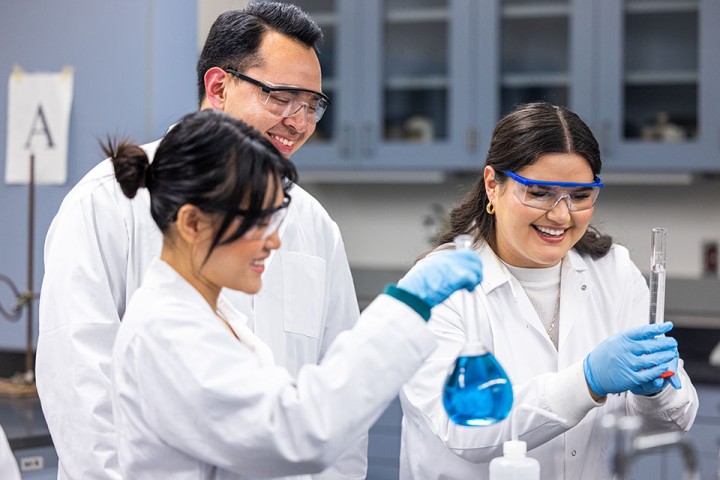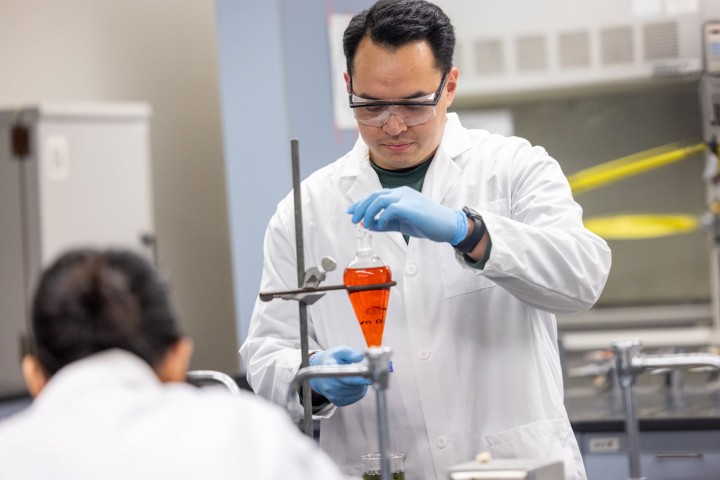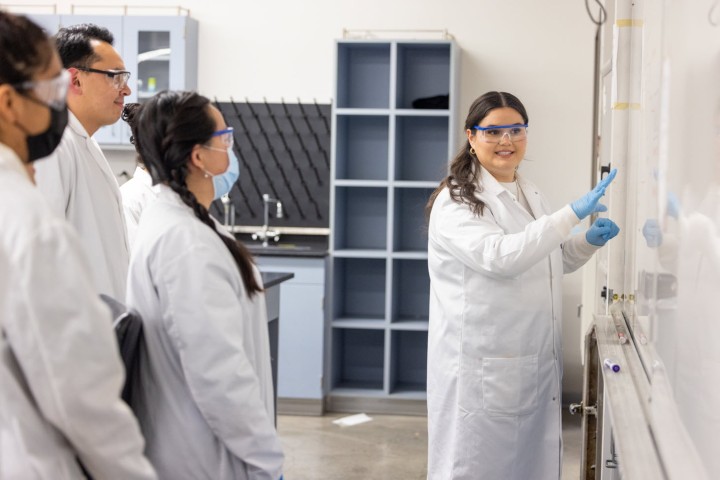The Department of Chemistry and Biochemistry offers two undergraduate degrees and a minor in Bioinformatics. Degrees are accredited by the American Chemical Society.
The Bachelor of Science degree in Chemistry and Biochemistry is designed to develop students to become contributing members in the scientific community, and be prepared to enter careers in chemical, materials science, pharmaceutical, biochemical, and molecular life sciences industries; careers in government, education, and academic laboratories; and to pursue advanced education in graduate and professional schools.
To learn about Cal State LA's program requirements for Bachelor of Science in Chemistry, see Chemistry, B.S.
__________________________________________________________________________________________
Program Requirements
Lower Disivion Core Courses (40 units)
- Chem 1100- Genral Chemistry (5 units)
- Chem 1110- General Chemistry II (5)
- Chem 2200- Organic Chemistry I (4)
- Chem 2201- Organic Chemistry Laboratory I (1)
- Chem 2211- Organic Chemistry Laboratory II (1)
- Math 2210- Calculus I (4)
- Math 2120- Calculus II (4)
- Math 2130- Calculus III (3)
- Math 2150- Differential Equations (3)
- Phys 2100- General Physics I: Mechanics (5)
- Phys 2200- General Physics II: Electromagnetism and Circuits (5)
Upper Division Core Courses (37 units)
Complete 33 units from the following courses and 4 units from the Advanced Analytical Chemistry Courses.
- Chem 3100- Writing for Chemists (3)
- Chem 3200- Organic Chemistry II (4)
- Chem 3500- Qualitative Analysis (4)
- Chem 3600- Inorganic Chemistry (4)
- Chem 4300- Introduction to Biochemistry (3)
- Chem 4410- Physical Chemistry: Quantum Mechanics and Kinetics (4)
- Chem 4420- Physical Chemistry: Thermodynamics (3)
- Chem 4430- Physical Chemistry: Quantum Chemical Methods (1)
- Chem 4431- Physical Chemistry Laboratory (2)
- Chem 4810- Advanced Synthetic Methods (2)
- Chem 4890- Molecular Science Capstone (3)
Advanced Analytical Chemistry Courses (4 units)
Select 2 courses from the following list. The third course may be used for the upper division elective.
- Chem 4510- Advanced Analytical Chemistry: Optical Spectroscopy (2)
- Chem 4520- Advanced Analytical Chemistry: Analytical Separations and Mass Spectrometry (2)
- Chem 4530- Advanced Analytical Chemistry: Electrochemistry and Surface Techniques (2)
Upper Division Electives (4 units)
Select 4 units from the following list with advisor approval.
Notes:
1. Advanced Analytical Chemistry courses (Chem 4510, Chem 4520, Chem 4530) that have been taken to satisfy the upper division core cannot be double-counted for elective.
2. Maximum of 1 unit of Chem 4990 may be used to satisfy the elective unit.
- Chem 3810-Honors Studies in Chemistry (2)
- Chem 3820- Special Topics in Chemistry (1-3)
- Chem 3821- Special Topics in Chemistry Laboratory (1)
- Chem 4200- Advanced Organic Chemistry 1 (3)
- Chem 4210- Polymer Chemistry (3)
- Chem 4310- Biochemistry I (3)
- Chem 4311- Biochemistry Laboratory I (2)
- Chem 4320- Biochemistry II (3)
- Chem 4321- Biochemistry Laboratory II (2)
- Chem 4450- Introduction to Atmospheric Chemistry (3)
- Chem 4460- Drug Delivery (3)
- Chem 4510- Advanced Analytical Chemistry: Optical Spectroscopy (2)
- Chem 4520- Advanced Analytical Chemistry: Analytical Separations and Mass Spectrometry (2)
- Chem 4530- Advanced Analytical Chemistry: Electrochemistry and Surface Techniques (2)
- Chem 4800- Special Topics in Advanced Chemistry Lecture (1-3)
- Chem 4801- Special Topics in Advanced Chemistry Laboratory (1)
- Chem 4830- History of Chemistry (3)
- Chem 4840- Drug Discovery and Development (3)
- Chem 4850- Bioinorganic and Bioorganic Chemistry (3)
- Chem 4860- Bioinformatics and Computational Biology (3)
- Chem 4980- Cooperative Education (1)
- Chem 4990- Undergraduate Directed Study (1-3)
- Crim 4150- Forensic Chemistry (3)
- Phys 4430- Biophysics (3)
The Bachelor of Science degree in Chemistry and Biochemistry is designed to develop students to become contributing members in the scientific community, and be prepared to enter careers in chemical, materials science, pharmaceutical, biochemical, and molecular life sciences industries; careers in government, education, and academic laboratories; and to pursue advanced education in graduate and professional schools.
To learn more about Cal State LA's Bachelor of Science in Biochemistry, see Biochemistry, B.S.
__________________________________________________________________________________________
Program Requirements
Lower Division Core Courses (46 units)
- Biol 1100- Cellular Basis of Life (5 units)
- Biol 1200- Diversity of Life (5)
- Chem 1100- General Chemistry I (5)
- Chem 1110- General Chemistry II (5)
- Chem 2200- Organic Chemistry I (4)
- Chem 2201- Organic Chemistry Laboratory I (1)
- Chem 2211- Organic Chemistry Laboratory II (1)
- Chem 2300- Introduction to Biomolecules (2)
- Math 2110- Calculus I (4)
- Math 2120- Calculus II (4)
- Phys 2100- General Physics I: Mechanics (5)
- Phys 2200- General Physics II: Electromagnetism and Circuits (5)
Upper Division Core Courses (31 units)
- Chem 3100- Writing for Chemists (3)
- Chem 3200- Organic Chemistry II (4)
- Chem 3500- Quantitative Analysis (4)
- Chem 3600- Inorganic Chemistry (4)
- Chem 4310- Biochemistry I (3)
- Chem 4311- Biochemistry Laboratory I (2)
- Chem 4320- Biochemistry II (3)
- Chem 4321- Biochemistry Laboratory II (2)
- Chem 4420- Physical Chemistry: Thermodynamics (3)
- Chem 4890- Molecular Science Capstone (3)
Upper Division Electives (7 units)
Notes:
1. Students must take a mimum of 2 units of coursework listed under Chemistry and a minimum of 2 units of coursework listed under Biology and Microbiology totalling 7 units to meet the major electives requirement for the Biochemistry B.S. program.
2. Students may apply a maximum of 1 unit of Chem 4990 to fulfill the elective requirement.
3. Students that seek to earn a B.S. Biochemistry degree that is approved by the American Chemical Society can do so by choosing an upper-division Chemistry course that includes at least 3 units of laboratory, or 1 unit of directed laboratory research (Chem 4990).
4. Electives listed with an asterisk (*) indicate the prerequisite of the course is not part of the Biochemistry B.S. program requirement. That is, the prerequisite(s) units are not to be counted toward the B.S. Biochemistry degree. Students should consult the program advisor prior to enrollment.
I. Chemistry Electives (2-5 units)
- Binf 4500- Advanced Topics in Bioinformatics and Computatioinal Biology (1)
- Binf 4540- Special Topics in Bioinformatics (complete 2 units) (1-2)
- Chem 4200- Advanced Organic Chemistry I (3)
- Chem 4210- Polymer Chemistry (3)
- Chem 4410- Physical Chemistry: Quantum Mechanics and Kinetics (4)
- Chem 4430- Physical Chemistry: Quantum Chemical Methods (1)
- Chem 4431- Physical Chemistry Laboratory (2)
- Chem 4460- Drug Delivery (3)
- Chem 4510- Advanced Analytical Chemistry: Optical Spectroscopy (2)
- Chem 4520- Advanced Analytical Chemistry: Analytical Separations and Mass Spectrometry (2)
- Chem 4530- Advanced Analytical Chemistry: Electrochemistry and Surface Techniques (2)
- Chem 4800- Special Topics in Advanced Chemistry Lecture (complete 3 units) (1-3)
- Chem 4840- Drug Discovery and Development (also listed as Biol 4440) (3)
- Chem 4850- Bioinorganic and Bioorganic Chemistry (3)
- Chem 4860- Bioinformatics (also listed as Binf 4000) (3)
- Chem 4990- Undergraduate Directed Study (limited to 1 unit) (1-3)
- Crim 4150- Forensic Chemistry (3)
- Phys 4430- Biophysics (3)
II. Biology and Microbiology Electives (2-5 units)
- Binf 4500- Advanced Topics in Bioinformatics and Computational Biology (1)
- Binf 450- Special Topics in Bioinformatics (complete 2 units) (1-3)
- Biol 3000- Biostatistics (4)
- Biol 3400- Principles of Genetics (3)
- Biol 4130- Molecular Diagnostics* (3)
- Biol 4150- Population Genetics (3)
- Biol 4160- Molecular Genetics (3)
- Biol 4170- Gene Editing Theory and Applications* (3)
- Biol 4180- Advanced Evolutionary Biology* (3)
- Biol 4240- General Embryology (3)
- Biol 4300- Fundamental Research in Plant Ecological Physiology (4)
- Biol 4320- Fundamentals of Toxicology (3)
- Biol 4330- Integrative Human Physiology (3)
- Biol 4340- Fundamentals Research in Human Physiology (2)
- Biol 4360- Neurobiology: Cellular and Molecular Physiology of the Nervous System (3)
- Biol 4370- Cell Signaling (3)
- Biol 4390- Endocrinology (3)
- Micr 3100- General Microbiology (also listed as Biol 3100)* (4)
- Micr 3300- Microbial Genetics* (3)
- Micr 3500- Bacterial Physiology (3)
- Micr 3700- Medical Microbiology (4)
- Micr 4100- General Virology* (3)
- Micr 4600- Theoretical and Applied Immunology (4)
The Bioinformatics (BINF) minor creates a strong foundation in knowledge and applications of software programs and databases commonly used by bioinformaticians and computational biologists. The student will gain an understanding of how bioinformatics data are organized and utilized to gain insights into molecular life science. The BINF minor trains students in the fundamentals of the design of algorithms and the implementation of computer programs that analyze biological data. This minor is suggested for students majoring in Biochemistry, Biology, and Chemistry. Other majors can opt for this minor but may have to take additional courses.
To learn more about the required prerequisites for Bioinformatics and Computational Biology, see Minor in Bioinformatics.
Required Prerequisites for the Minor
There are required prerequires for the BINF minor for students who are not biology, chemistry, or biochemistry majors. These are:
- Biol 1100
- Biol 1200
- Math 1085 or Math 1083 or Math 1040 (or equivalent math course). Students must receive a grade of C or better in Biol 1200 and the Math course.
Requirement for the Minor
A total of 14-17 units are required. A minimum of 12 unots in the minor must be distinct from the core requirements in the student's major, but may overlap with electives in the major.
Successful completion requires a 2.0 overall grade point average in the BINF minor, be in good academic standing, and the completion of all minor courses by the time students earn their baccaulaureate.
Requirements for the Minor (14-17 units)
Upper Division Required Courses (8 units)
- Binf 4000- Bioinformatics (3)
- Binf 4500- Advanced Topics in Bioinformatics and Computational Biology (1)
- Biol 3000- Biostatistics
Upper division Electives (6-9 units)
From the list below with advisor approval, students majoring in biology need to complete 9 units; all other majors need to complete 6 units.
NOTE: A minimum of 12 units in the minor must be distinct from the core requirements in the student's major, but may overlap with the electives in the major.
- Binf 4540- Special Topics in Bioinformatics (1-3)
- Biol 3400- Principles of Genetics (3)
- Biol 4080- Advanced Biostatistics (3)
- Biol 4150- Population Genetics (3)
- Biol 4540- Special Lecture Topics in Biology (1-3)
- Chem 4300- Introduction to Biochemistry (3)
- Chem 4310- Biochemistry I (3)
- Chem 4320- Biochemistry II (3)
- Chem 4800- Special topics in Advanced Chemistry Lecture (1-3)
Most courses in science and mathematics build directly on subject-matter presented in earlier courses. It is essential to observe all prerequisites listed in a course description. Prerequisites are established for solid academic reasons, and are designed with the student in mind, by ensuring that they are prepared for their classes ahead. Further, mathematics is a critical skill for chemistry and physics. Therefore, students are highly recommended to take mathematics classes at the earliest opportunity in their program.
- B.S. CHEMISTRY PROGRAM - BS CHEM Prerequisite Map PDF; BS CHEM 4 year roadmap PDF; BS CHEM 2 year roadmap PDF for transfer students
- B.S. BIOCHEMISTRY PROGRAM - BS BIOCHEM Prerequisite Map PDF; BS BIOCHEM 4 year roadmap PDF; BS BIOCHEM 2 year roadmap PDF for transfer students
Typical Course Offerings (updated March 2024)
Undergraduate Program Learning Outcomes
Students seeking a Bachelor of Science degree in Chemistry or Biochemistry will apply and integrate foundational knowledge and critical thinking skills to identify and solve scientific problems. Students will develop the ability to become contributing members of the scientific community, both as individuals and while working in teams, and will develop the creativity to generate solutions to societal needs.
Students will be prepared to enter careers in chemical, materials science, pharmaceutical, biochemical, and molecular life sciences industries; careers in government, education, and academic laboratories; and to pursue advanced education in graduate and professional schools.
Specifically, graduates from chemistry and biochemistry will:
I. Demonstrate fundamental knowledge, including chemical and biochemical theories, concepts, and laboratory methods:
- conceptualize, model, and explain chemical and life processes at the molecular level
- manipulate, synthesize, and analyze molecules and their properties using contemporary laboratory equipment and methods
- practice safe handling of equipment, molecules, and organisms
- recognize the relationships between the traditional sub-disciplines within chemistry and the connections between chemistry and other disciplines
II. Understand and use scientific processes to create knowledge of molecular properties and behavior:
- develop and evaluate scientific questions and hypotheses
- design methods, including use of appropriate equipment, instrumentation, and computer software, for investigating scientific questions and hypotheses
- recognize limitations of experimental methodologies
- generate and record quantitative and qualitative data
- apply concepts of approximation, estimation, precision, and accuracy in data acquisition and problem solving
- quantitatively analyze data, evaluate the validity of data, and interpret meaning from data to generate scientific results
- generate conclusions based upon evidence supported by results
- model ethical behavior intrinsic to the scientific process of knowledge generation
III. Demonstrate the ability to effectively communicate science:
- employ technical and ethical conventions for written and oral reports
- place findings within the context of current scientific knowledge by locating, retrieving, understanding, evaluating, and citing relevant scientific literature
- gain familiarity and practice with the process of working in teams and peer evaluation
IV. Understand and appreciate the importance of chemistry and biochemistry to society as a whole:
- explain how scientific reasoning and processes can inform policy decisions
- provide examples of scientific discoveries that have improved society
- recognize how chemistry and biochemistry work with other scientific disciplines to address societal needs
Advising
Chemistry and Biochemistry student majors are advised through the NSS Academic Advisement Center. The NSS Advisement Center provides guidance on course selection, career planning, navigating university resources, and assisting students achieve their academic and professional goals. Please visit the link to schedule an appointment.
The minor in Bioinformatics advisor is Dr. Jamil Momand.
Email: [email protected]
Office: La Kretz 270
Advisement Hours: e-mail [email protected] for an appointment.
Be Involved

The Chemistry and Biochemistry Club is a student-run organization made up by students who are dedicated to helping all majors succeed in their classes. The club hosts events such as invited speakers, organizes peer tutoring, professional development opportunities, and more! To learn more, visit Chemistry and Biochemistry Club.
The Cancer Research and Awareness Society is dedicated to cancer research and awareness. To learn more, visit Cancer Research and Awareness Society.
The Society for the Advancement of Chicanos/Hispanics and Native Americans in Science (SACNAS) aims to create a platform for STEM students on Cal State LA campus to network and join in community. To learn more, visit SACNAS Chapter at Cal State LA.
Cal State LA and Molecular Software Sciences Institute (MolSSI) at Virginia Tech collaborate to incorporate machine learning techniques in molecular simulatioin research and develop pedagogical materials in computational science. Cal State LA undergraduate and graduate students participate in year-round mentored research and attend annual MolSSI workshop. Read more and apply at Cal State LA- MolSSI Prec.
The College of NSS encourages undergraduate students to gain experience by participating in professional academic conferences, posters and presentations, all of which may include travel in California and out-of-state. Students funded through Undergraduate Travel Support may receive partial reimbursement of costs for travel, lodging, and conference registration in support of their professional academic conference papers, posters, and presentations. To learn more, visit Support for Student Travel.
STUDENT RESEARCH

Undergraduate students in Chemistry and Biochemistry may participate in Directed Research Studies (CHEM 4990). Students gain an introduction to academic research by being involved in all aspects of faculty mentor's research projects, and develop technical, writing, critical thinking and analytical skills, while focusing on a specific research question.
Students interested in research can learn more about each faculty's research and publications:
Tutoring

FREE Tutoring is available for chemistry classes through the Center of Academic Success and by student members of the Chemistry and Biochemistry Club.